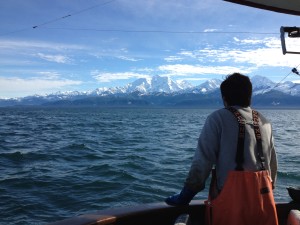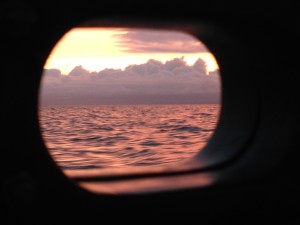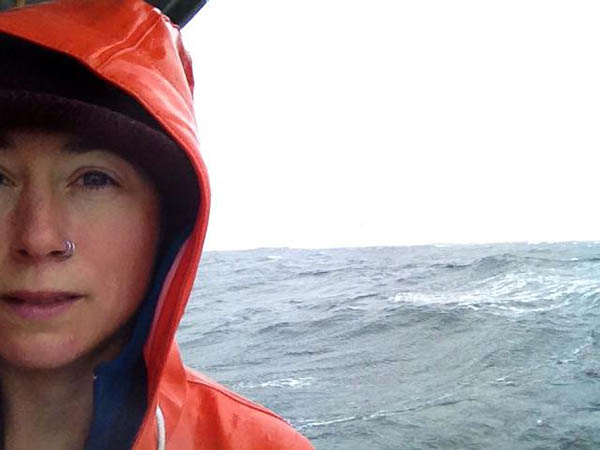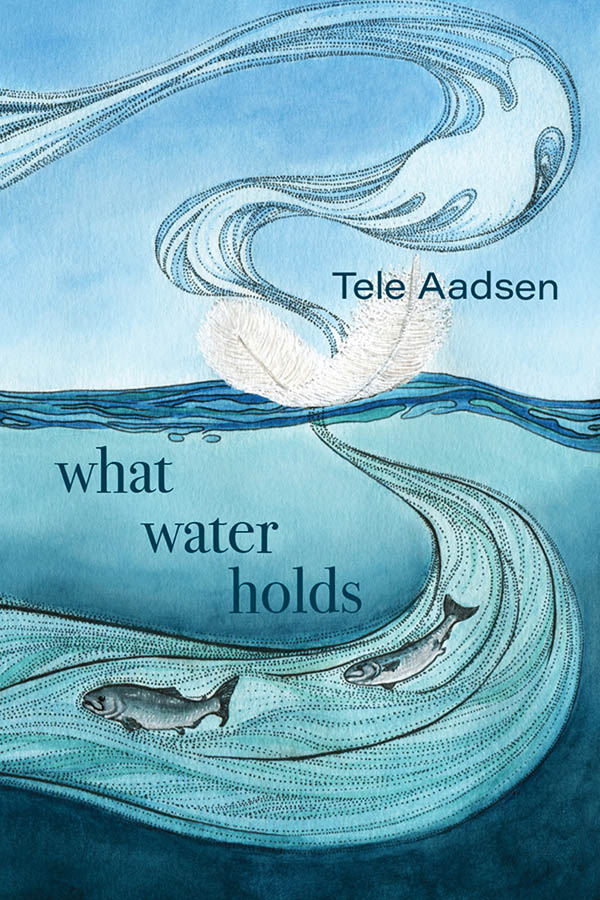Last June, my editor’s response to Draft #2 arrived on our doorstep just as we were preparing to head north. If there can be a good time or place to face the fact that your book needs major revisions, I found mine in the Nerka’s pilot seat, alone on my wheel watches while Joel slept, the promise of Alaska ahead. My manuscript was heavy in my lap as, removed from the world within this pocket of suspended time, I read it from beginning to end. All 323 pages, many of the margins dark with penciled edits. Then I read it again. Comments that stung the first time through merited contemplation on the second. By the third read, I agreed with most of them.
When we arrived in Sitka, I reunited with my friend Mary. She, like too many people in my transient life, is someone I’d like to share more time with. I suspect we’d uncover much common ground, given the opportunity, but abbreviated shore leave has limited us to Facebook exchanges and parking lot huddles. And to this moment, two women stepping out of a cluster of male captains to nurture a seasonal connection on a bustling dock.
She asked how my book was going. I told her what I’d just realized, seeing through my editor’s eyes: I’d lost my hold on the story.
“I wandered over here,” I flapped my right hand toward the breakwater, “into issues of sex and monogamy and fidelity. But that wasn’t the core narrative.
“It’s here,” palms together, heart-center, “in the tension of being together and separate. The struggle to maintain your identity as a strong, independent person, while in partnership with someone else. Being dependent on each other while staying true to the person you want to be, all within the confines of a boat. What that looks like.”
Bobbing her head, Mary’s eyes grew shiny. “Yes, yes – oh my god, yes!”
That affirmative response was a gift. She was the first person I shared this renewed direction with, and her enthusiasm helped me trust I was on the right track. That I could wrestle the narrative back to where it needed to be, and that this tension between self and couple was the point of connection between author and reader. It was the place where my story could become bigger than myself.
I don’t write on the boat. I’m on deck working eighteen, seventeen, fifteen hours a day, for weeks at a time. In the cabin, Joel and I are always within six feet of each other. Our town time is chore-focused, rushing through tasks to get back out as soon as possible. If bad weather grants us an unexpected day off, I just want to sleep. (I am so, so fortunate that Riverhead gets this. In gracious deadlines and tolerance for an author who’s incommunicado for months, my editor has demonstrated her value of my fishing life and this book.)
I don’t write on the boat, but I do think about writing. My friend Andrea says this counts. She calls this mulling over character development, metaphor, and just-right sentences “composting,” and says it’s an essential part of the writing process. I agree. I spent a lot of time composting this summer, thinking about that dockside conversation. Surely Mary and I couldn’t be alone in our experience of doing work we loved, with the person we loved, knowing the wondrous fortune of our lives – and still nursing a quiet fear that we sacrificed some essential part of our self along the way.
Were there more of us?
I put a card in the mail to a woman I love and respect, someone who was once in the same boat as my friend and me, having gone to sea with her male partner many years earlier. Joni began fishing in the 1960s. I asked how it had been for her, what she recalled of that experience, what it meant to her now.
When her response arrived a month later, I didn’t read it. I wanted to wait for a quiet, solitary space, a time when I could give her words my full attention. Space and time: the two things that don’t exist on the boat. It was only within the past few days that I finally opened her email. I’m still trying to pick myself up off the floor, so moved by the generosity with which she gave her story.
Joni’s story is not mine to share – and yet, her story is mine. You know how the cliché goes: the more things change, the more they stay the same. Together, we span six decades in fishing. I think about how the harbors have changed – more female deckhands, more couples running boats together, more women running their own boats – and then I hear a voice in my head, whispering questions of identity, belonging, invisibility. And I can’t tell whether it’s Joni’s voice speaking, or my own.
This is why I read and write memoir: because I want to light these places we don’t often reveal to each other. Vulnerabilities we mask, doubts we’re not supposed to acknowledge. In placing a higher virtue on silence than on trust, we commit to our own alienation. We build our walls higher, failing to see that the experiences that leave us feeling isolated are the very ones with the power to bring us together. I tell my story because I want to know yours.
My hunch is that this issue isn’t only a women-on-boats struggle. For many of us, the challenge to preserve some sense of “me” amongst a “we” is simply an effect of growing up as a girl-child in America, socialized from Day One to put ourselves second. So I wonder if this speaks to you, and if it does, how you’ve navigated the tension between self-identity and partnership. What the rewards and sacrifices have been. If your definitions of “reward” and “sacrifice” have changed over time.
And I wonder, too, what these questions bring up for Hooked’s male-identified readers. Many of you originally started following this blog for the fish stories; that you’ve stayed through meditations on gender and self-identity means a lot to me. You’re infused with cultural expectations different from those I grew up with – different; no less powerful. I wonder what you identify as the leading messages of your life, how you internalized them, and how those messages have impacted your life and relationships.
While I searched for the right thought to close this post, yet another inspiring woman from the fleet provided the words I was looking for. Thank you, Erin, for sharing this quote right when I needed to hear it.
“What we hunger for perhaps more than anything else is to be known in our full humanness, and yet that is often just what we also fear more than anything else. It is important to tell at least from time to time the secret of who we truly and fully are … because otherwise we run the risk of losing track of who we truly and fully are and little by little come to accept instead the highly edited version which we put forth in hope that the world will find it more acceptable than the real thing. It is important to tell our secrets too because it makes it easier … for other people to tell us a secret or two of their own … ”
— Frederick Buechner (Telling Secrets)
I’m asking big questions at a busy time, friends. Hooked’s FINAL final manuscript is due this December. Between revisions and managing all our own fish marketing for the first time, I’m out-of-my-head swamped. Forgive my belated response to the conversation. Trust that I’m reading — I hear you — and I’m grateful to know you. Love and appreciation to all.





I think you should be writing two books ;; one of a summer on nerka with joel ;;loving your surroundings;being on boat with one you love; and enjoying yourself!! and another one describing your troubles with your gender and feminity!! first one would be a big seller!! the other not so much
Oh, it’s all one book, Tom. (Do you really think I want to go through this process again? 😉 ) Those issues are inextricably linked for me, and — as I’ve been learning along the way — for many other women, too. It’s entirely possible that you’ll be disappointed with the end result, finding a book less about fishing than one about relationships, but I’m writing the book I need to write — and one that, I trust, other women will relate to, also. Few people can relate to fishing; most of us have struggled with self-identity and relationships. It’s not for me to say what kind of seller it will be, but it’s my hope to write a book that rings true for my readers, regardless of their connections to fishing.
Maybe you’ll find yourself pleasantly surprised. 🙂
I know its only one book tele; I have felt the emotion your writing can deliver; my suggestion is that if you cannot get it strait in your mind it may be time to again be your own person and tell your publisher to take you off their list until you are ready finish the book; some people are unable to meet deadlines’ but can do their work if given time to do so on their own schedule; they are not the only publishers; let yourself be the boss; I know I said I would quit bugging you !!if I didnt’care I would.…
Oh man do I ever have thoughts for you! I hope I can find some way(s) to share them.
The reason we read you, Tele, is precisely because, as you did with this post, you leave us either wanting to embrace the very next person we see with all our strength, or because we just want to curl up in a corner and weep… or both.
The reason we await your book is not because it’s a this, or a that, but because it is yours.
You can totally do this, and you will, and I can’t wait to hold your book in my hands!
Bingo!
Tele, The other older fishing woman is right; things haven’t changed that much since the 1960s on the man-woman-boat theme. To keep it all together in your memoir will be unique and illuminating. Well – not quite unique as I wrote a novel on this very topic a long time ago – never got it published. Maybe I should dust it off!! Maybe to draw the two themes together you might try adding more direct dialog on the issues, to replace monolog as in memoir– or maybe you have – I haven’t seen what you wrote except your early stuff on the good fishing life. And don’t let that deadline put you off from what you are inspired to do. Stay with your story. What does deadline mean, the money threat? Don’t they want art? Hang in there.
My own current book out in Nov deals with this very little, just one short chapter, as it is mostly on the socio-political-economic side of small boat fishing, with some interviews that do touch on your theme, but again,briefly. I, so far, have published social histories. Mine: ” Rough Waters: Our North Pacific Small Fishermen’s Battle –a Fishing Family’s Perspective”
One book that does go into the man-woman-fishnet theme, (plus man’s extended family!)-If you haven’t seen it, you will enjoy it I think : Surviving the Island of Grace, by Leslie Fields. she stayed with it plus adding about 6 kids at a setnet camp on Kodiak. Still going I’m sure. You have something even more intense on the boat, as I know. Nancy
Tele, first to say we are happy to hear Joel made it safely home covered in tuna glory, and good for him! And then to say I hope your retreat into solitary pursuit of the illuminating words you seek to express all that is in you is suitabley rewarded, and that looming deadline becomes as a gossamer thread– from all we have read of your writing, it is so alive and brave and honest that we become kin as it were, and better people for the sharing. I think Grainsifter above says it well. We all love you for what you are, and for sharing so well and so bravely your experiences of life and the human condition – and for your perceptive and caring soul. I have not seen your writing as a search for self-identity or equality in the male workaday world… you transend those barriers between the sexes with your abilities…no question you are part of the success of your fishing venture, and if others don’t get it they can go push a rope! Love and may all conspire to see you into victory ahead of that beastly deadline – I never dreamed writing a best-seller could be as gut-wrenching as giving birth!
Tele, you sure can capture a moment. All summer I reflected on that conversation. Even had a second shared ‘rinse cycle” furtive huddle up with another woman in the Hoonah laundromat… and yes, knowing that it’s a shared narrative makes it easier to live with gracefully. I also want to talk and read more about the tension between “working with” and “working for”. I can’t wait to read more. These conversations (in whatever form) are opening doors for me.
Tele — As a fellow woman of the ocean, captain of a boat on which I work and live within a handful of feet from my beloved, I believe you have done a beautiful job of working with the myriad themes that weave throughout this life regarding fishing, partnership at sea, identity, femininity, purpose etc. I am grateful for your words and continued dedication to explore the inner regions of the heart and mind through this memoir. I look forward to sharing more stories in person — perhaps at Fisher Poets again. This time I’m ready to contribute my own voice!
Yea!
I am happy to read what you are writing. I will continue to read everything. ..
I have always remembered you from the dismal U.
Living in Homer if you ever come this way.
Kellie-Tree
Tele, I so love reading your posts. When I am working on something, and it’s not yet ready, I call it percolating, like the old coffee pot. Bits and pieces come through, but not quite fully ready to be presented. And sometimes it comes out too weak or too bitter and I have to throw the whole pot out and start over, watching it more closely. I have also experienced the phenomenon of, the closer the deadline is, the more creativity asserts itself.
Remember to take time to fully breathe and be mindfully present to notice the small details around you. The fall colors must be beautiful by now. Is there new snow on Mt. Baker? Is the boat cat adjusting to land? Sending you hugs and love.
Your writing moves me with its heart. It is an arrow that reaches the core, so I see, really see you…and me. It is a delight to recognize a strong, beautiful woman making her way in the world. And part of your strength is the vulnerability you share. The stories are not new, but the flavor of Tele makes them unique. I look forward to enjoying whatever comes to print.
Tele your writing is something amazing. I look forward to devouring your book. Amazing. Keep it up. Tell Joel Mikee say’s hi!